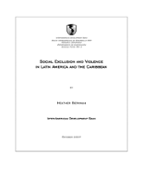Social Exclusion and Violence in Latin America and the Caribbean
Date
Oct 2007
This paper examines how social exclusion contributes to violence in communities throughout Latin America and the Caribbean. Residents in socially excluded communities cannot depend on those institutions designed to protect them, and violence becomes an instrument to achieve certain outcomes, such as justice, security, and economic gain. When conventional methods of obtaining and working for increased social status, higher income, and wider influence are limited, as they often are in marginalized areas, some feel compelled to resort to violent acts. This paper discusses how social exclusion and violence interact in a vicious circle that leaves the socially excluded in a very hostile social environment where the borders between legal and illegal, legitimate and illegitimate are often fuzzy and uncertain. In this environment violence is used by a minority to acquire justice, security, authority and economic gain. The use of violence by this minority, however, affect the lives of the majority of excluded people that do not resort to violence. As youths are particularly vulnerable to this issue, this paper also examines the relationship between violence and the plight of Latin American youth gangs and street children.



